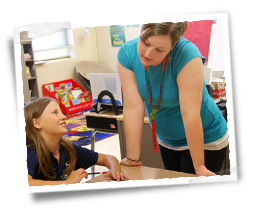


Researchers are focused on learning more about what good teachers do in their classrooms. But Tim Daly, president of the New Teacher Project, warns this might go too far. His concern is that the complex craft of teaching will be reduced to a checklist of things all teachers will be required to do. He says there are many ways to be an effective teacher. The bottom line is, do the students learn? Daly says one way to think about good teaching is to think about the question, what makes a good comedian?
"Is it a person that tells jokes in a certain way?" he asks. "Is it somebody that is very racy and uses a lot of profanity? Is it somebody that talks about everyday things or tells long stories?"
No, Daly says. "We can think of people that are considered very good comedians who do it every different manner of way. The universal is that people laugh," he says.
And that's his point about good teaching. The universal is that students learn. This is why Daly and many other education leaders say using student test scores to evaluate teachers is essential. They say teachers should be judged by how much their students learn every year. (For more on the debate about using test scores to evaluate teachers, click here).
Focusing on what students learn is part of a larger shift in thinking about education. It's this shift that's driving the debates about teachers.
For a long time, the way researchers and policymakers measured school quality was in terms of inputs. To compare schools, they looked at spending. To evaluate teachers, they looked at qualifications. They were interested in how much money was put into schools, how much training was put into teachers. It turns out this input-oriented approach doesn't reveal much about the quality of education. Teachers who are certified are not necessarily more effective than teachers who aren't. Schools that spend more money are not necessarily better than schools that spend less.
So the lens has shifted to outputs. What are schools getting for the money they spend? What are students learning from the teachers they have? Researchers and policymakers focus on outputs because they can. There is a lot of data — enabled by computers, the development of new methods of measurement, and laws that require testing in schools.























